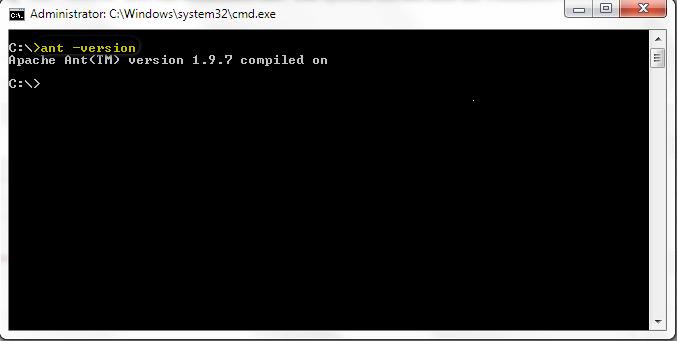

To verify if Ant is installed, use the commands below: ant -version To install Apache Ant using apt-get, simply execute the following commands: sudo apt update To install the latest, you may have to install it manually or via third-party repositories. However, the version with comes with Ubuntu repositories might not be the latest version. Install Apache Ant via AptĪpache Ant comes via Ubuntu default repositories. OpenJDK 64-Bit Server VM (build 25.242-b08, mixed mode)Īfter, continue below to install Apache Ant. It should output something similar as shown below: Output: Sudo apt-get install openjdk-8-jdk openjdk-8-doc openjdk-8-jre-libĪfter installing Java, you can verify it by running the commands below: java -version


To do that, run the commands below: sudo apt update First, download the Java 8 Development Kit: either the official Oracle JDK or Open JDKįor this tutorial, we’re going to install OpenJDK. To get started with installing Apache Ant on Ubuntu, please follow the steps below: Install OpenJDK 8Īpache Ant is a Java-based app so you’ll need Java installed. Ubuntu is an open-source Linux operating system that runs on desktops, laptops, servers, and other devices. It’s a great Linux operating system for beginners. If you’re going to be developing Java apps, you may need Apache Ant to help automate the process.įor students or new users looking for a Linux system to learn on, the easiest place to start is Ubuntu Linux OS. Reverse Dependency Explorer: helps you work with conflicting dependencies amongst several projects.Īpache IvyDE can be also used with other plugins like WTP and Apache Ant.įor a quick overview, let's watch the screenshots of the last released version.This brief tutorial shows students and new users how to install Apache Ant on Ubuntu 20.04 | 18.04.Īpache Ant is a Java library and tool that has several built-in tasks allowing one to compile, assemble, test, and run Java applications.Ivy console: presents every log from Ivy to assist in debugging a failing resolve.Ivy settings files editor: completion for XML tags, attributes, and attribute values.Ivy XML files editor: creation wizard, html preview and completion for Ivy XML tags, attributes, and attribute values.Managed classpath container: automatic downloads, access to the Ivy "resolve" task from your IDE, and a feature allowing you to develop interdependent multi-module applications in one workspace.

A summary of the features it provides follows: It lets you manage your dependencies declared in an ivy.xml in your Java Eclipse projects, or any other kind of project which needs dependency management. Apache IvyDE is the Eclipse plugin which integrates Apache Ivy's dependency management into Eclipse.


 0 kommentar(er)
0 kommentar(er)
